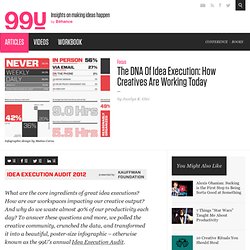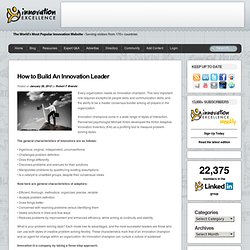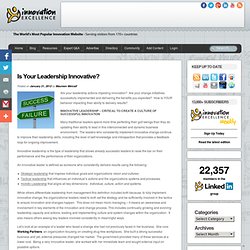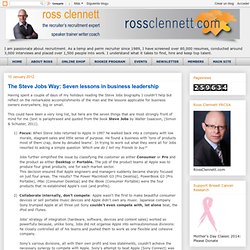

Turning open data into liquid information. Mobile Boom Time - Forbes. The DNA Of Idea Execution: How Creatives Are Working Today. What are the core ingredients of great idea executions?

How are our workspaces impacting our creative output? And why do we waste almost 40% of our productivity each day? To answer these questions and more, we polled the creative community, crunched the data, and transformed it into a beautiful, poster-size infographic – otherwise known as the 99U’s annual Idea Execution Audit. Sponsored by the Kauffman Foundation, the Idea Execution Audit premiered at our annual 99U Conference in early May. The results present a fascinating window into our particular productivity struggles ichn the year 2012. 1.
Everyone is struggling with how to balance others’ demands with being productive in the things that matter most. It’s not surprising then that while creatives are working 9 hours a day on average, only 5.5 of those hours are truly productive. 2. So what are the time-sucks that are eating up 40% of our day? I’d also wager that the trend toward “open” offices is causing some problems. 3. 4. (Almost) Everything You Ever Wanted to Know About Creativity. 1Share Synopsis To be creative can be as simple as seeing something everyone else sees, but thinking what no one else thinks about it. How simple ideas lead to scientific discoveries. How Any Company Can Think Like A Startup. Common wisdom states that startups are hothouses for creativity and innovation, while large corporations are too jammed up with bureaucracy and hierarchy to push the envelope and arrive at new solutions.

Sir Ken Robinson: Do schools kill creativity? Infographic Explains Mind Mapping For Beginners. What does it takes to go viral? Quirky. How to Build An Innovation Leader. Every organization needs an Innovation champion.

This very important role requires exceptional people skills and communication skills, and the ability to be a master consensus builder among all players in the organization. Innovation champions come in a wide range of styles of interaction. Renowned psychologist Michael Kirton developed the Kirton Adaptive Innovation Inventory (KAI) as a profiling tool to measure problem-solving styles. The general characteristics of innovators are as follows: • Ingenious, original, independent, unconventional • Challenges problem definition • Does things differently • Discovers problems and avenues for their solutions • Manipulates problems by questioning existing assumptions • Is a catalyst to unsettled groups, despite their consensual views. Where good ideas come from.
Innovation Tweets. The Intersection of Human and Organizational Innovation Capabilities. Guest post by Ralph Ohr One of my main interests is looking at the intersection of organizational and human capabilities.

Business is accomplished through people, thus individual mindset, behavior and capabilities determine organizational performance. When it comes to innovation, a recently published research paper, titled ‘The Bias Against Creativity’ serves as a good example. The findings indicate a paradox that people desire but reject creativity. The authors explain this paradox by proposing that people can hold a bias against creativity that is not necessarily overt, and which is activated when people experience a motivation to reduce uncertainty. If people hold an implicit bias against creativity, then we cannot assume that organizations, institutions or even scientific endeavors will desire and recognize creative ideas even when they explicitly state they want them. This suggests two main points: Cognitive orientation: Analytical thinking vs. Creative orientation: Searchers vs.
Is Your Leadership Innovative? Are your leadership actions impeding innovation?

Are your change initiatives successfully implemented and delivering the benefits you expected? How is YOUR behavior impacting their ability to delivery results? Innovative Leadership – Critical to Create a Culture of Successful Innovation Many traditional leaders spend more time perfecting their golf swings than they do updating their ability to lead in this interconnected and dynamic business environment. The leaders who consistently implement innovative change continue to improve their leadership skills, including the level of self-knowledge and introspection that provides a feedback loop for ongoing improvement. Innovative leadership is the type of leadership that allows already successful leaders to raise the bar on their performance and the performance of their organizations. An innovative leader is defined as someone who consistently delivers results using the following: We keep hearing that the world is changing and it is.
The Steve Jobs Way: Seven lessons in business leadership. Having spent a couple of days of my holidays reading the Steve Jobs biography I couldn't help but reflect on the remarkable accomplishments of the man and the lessons applicable for business owners everywhere, big or small.

This could have been a very long list, but here are the seven things that are most strongly front of mind for me (text is paraphrased and quoted from the book Steve Jobs by Walter Isaacson, (Simon & Schuster, 2011). 1) Focus: When Steve Jobs returned to Apple in 1997 he walked back into a company with low morale, stagnant sales and little sense of purpose. He found a business with ‘tons of products most of them crap, done by deluded teams'. In trying to work out what they were all for Jobs resorted to asking a simple question 'Which one do I tell my friends to buy? ' Jobs further simplified the issue by classifying the customer as either Consumer or Pro and the product as either Desktop or Portable. You need to have a collaborative hiring process.